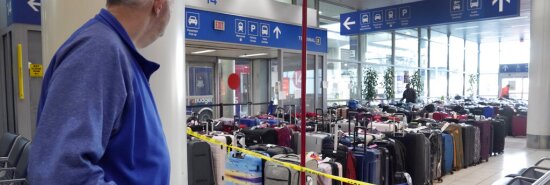
To fix the airlines, the government must first do no harm
Tiana Lowe
Video Embed
After a straight week of Southwest Airlines canceling a majority of its flights amid an internal crisis, Democrats have turned not just on the low-cost carrier, but on the industry as a whole. Sen. Elizabeth Warren (D-MA) has used the Southwest catastrophe to renew her calls for the Transportation Department to block the merger of JetBlue and Spirit Airlines, and Rep. Katie Porter (D-CA) has proposed that Congress fine airlines 10 times the original ticket price for flight cancellations they fail to refund promptly.
But all of these solutions ignore the specific problem plaguing Southwest, namely its medieval scheduling software overdue for implosion and the ways in which the government has more broadly empowered the worst excesses and market control of the airlines.
TESLA STOCK CRASH ISN’T ELON MUSK’S FAULT
The obvious point to critique is the reckless, no-strings-attached government funding of airlines during the pandemic. Of the $54 billion Congress gifted to the airlines in total COVID-related spending, Southwest scored $7 billion. Rather than use the temporary crash in airline demand and influx in taxpayer money to overhaul its internal software, what did the airline do? Wait until a winter storm triggered a scheduling crisis, leaving empty planes devoid of crews and passengers stuck in airport hotels for the holidays.
On top of this flagrant rent-seeking, padding the pockets of Southwest executives with no consumer surplus offered in return, the government has long catered to airline lobbying designed to control the transit market artificially. Recall that in Texas, where Southwest is headquartered, the airline virulently lobbied against a privately funded high-speed rail development.
“The American reality is that high-speed rail will be viable in Texas only by destroying the convenient and inexpensive transportation service the airlines now provide, and only by absorbing huge public subsidies,” Southwest wrote in a brief to the Texas High-Speed Rail Authority, which was created by the Texas legislature to evaluate the Texas TGV.
But far from focusing solely on local authorities, Southwest also lobbied the federal government. As an article in the Journal of Air Law and Commerce indicates, Southwest’s case involved “opposing Congress’ ultimately successful attempt to allow the use of tax-exempt bonds for high-speed rail development, encouraging Texas’ legislative prohibition of the use of state money for the high-speed rail program, and challenging administratively and judicially the creation of the Authority and award of the franchise in 1991 to the Texas TGV Consortium.”
All of that opposition to government largesse would be a little more palatable if Southwest did not benefit from exactly the same type of taxpayer-funded charity.
Transportation Secretary Pete Buttigieg‘s reminders that airlines owe passengers a refund in greenbacks, not flight credits, for certain cancellations are crucial and correct. But they (and all future regulations and punishments that the airlines may face) mean nothing and practically do nothing if airlines are allowed, as they have in the past, to take money while barring competitors in order to dilute their market share. Before the government punishes the airlines, it needs to commit to some fiscal discipline and implement fair rules for all providers of current and potential mass transit.
CLICK HERE TO READ MORE FROM THE WASHINGTON EXAMINER
